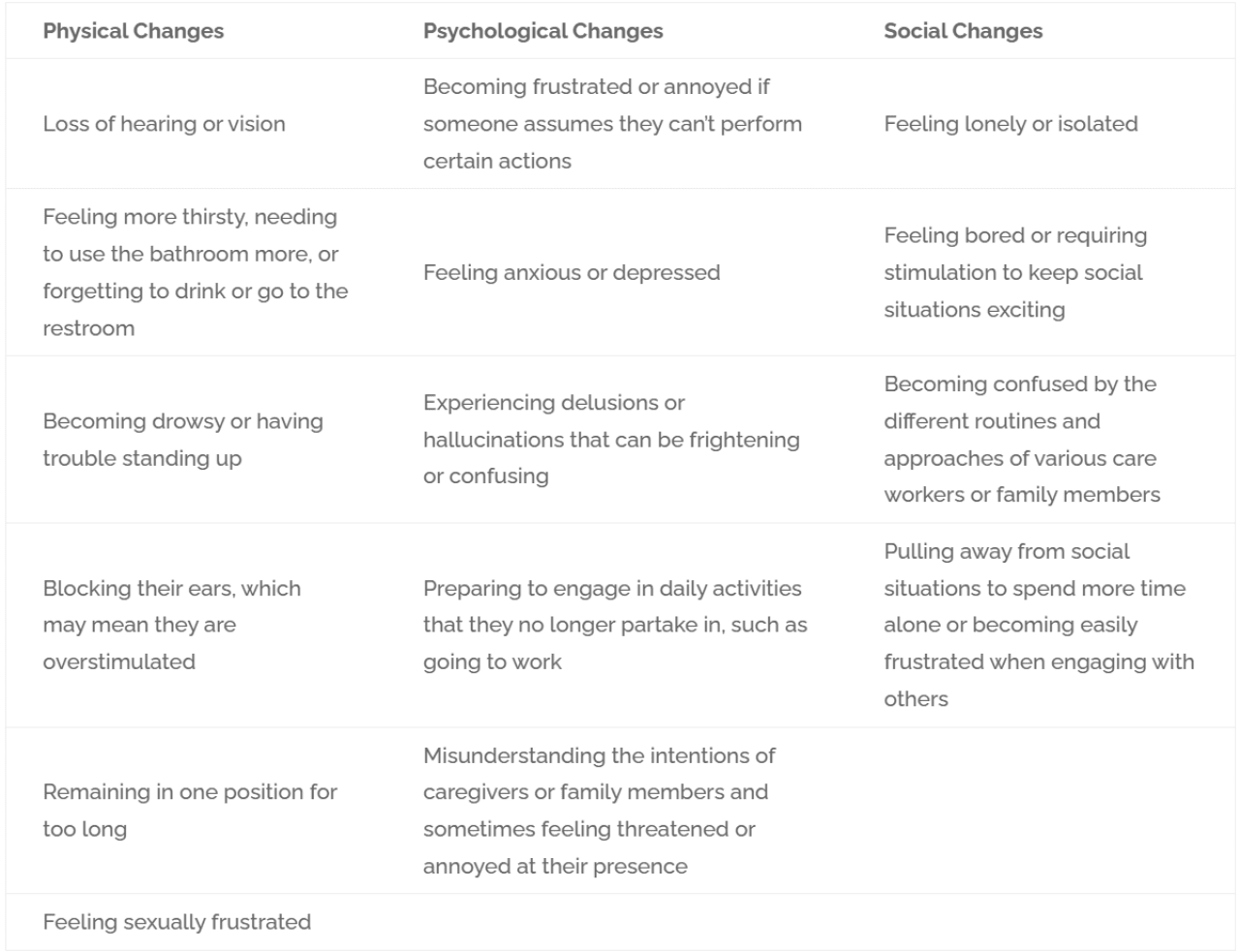How to help an elderly person with dementia

9nong // Shutterstock
How to help an elderly person with dementia
Older people living with dementia require ongoing support, understanding, and care. For many family members, caring for their loved one brings many responsibilities. Sometimes, it can be overwhelming.
If you’re caring for a relative with dementia, remember that it’s OK to ask for help. This guide from Village Caregiving outlines five simple steps to care for your loved one with dementia.
Understanding Dementia
Dementia is a medical term used to describe the symptoms associated with the loss of cognitive functioning. It interferes with a person’s thinking, remembering, and reasoning, which affects their everyday life. Around one-third of all people over the age of 85 have some form of dementia.
Dementia progresses from the early stage to the middle, then to the late stage. In the early stages, individuals may experience symptoms like mild memory loss and changes in mood and behavior. However, as the disease progresses, they may face severe memory loss and become fully dependent on others for basic needs and daily functions.
The progressive nature of dementia takes a toll on the family members who typically become the family caregiver. It makes caring for a parent with dementia at home more challenging and calls for ongoing support.
Tips for Families Caring for a Loved One With Dementia
Dementia and its unpredictable symptoms can make it challenging. Here are some tips to support your loved one to cater to their needs and yours:

Village Caregiving
1. Use Compassionate Communication Strategies
Supporting a person with dementia can pose challenges for caregivers when it comes to communication. People with dementia may have trouble remembering things. They can become agitated when they can’t find the right words to respond with. As their ability to process information deteriorates, their responses may be delayed and they might appear frustrated.
As a family caregiver, it’s important to understand that the disease causes changes in communication. Don’t take any frustrations personally. Try out some of these strategies when talking to someone with dementia:
- Speak slower: Use a slow, steady pace when speaking so they can better process what you’re saying. Speaking slower also helps you come across more clearly, leaving no room for doubt or misinterpretation.
- Use nonverbal cues: Nonverbal cues include eye contact, physical touch, and a nonjudgmental tone of voice.
- Be understanding: If you become frustrated, remind yourself that the disease is the cause of their delayed speech.
- Distract them: If you’re having trouble communicating and feel the conversation isn’t going anywhere, use an activity. Try looking through a photo album or engaging in a hobby to relieve any frustrations.
- Use simple language: Try to avoid complicated words and complex sentences. Since they may have trouble processing what you say, keep it as easy to understand as possible.
2. Create a Safe and Supportive Environment
People with dementia typically prefer a home environment that’s comforting and familiar. Any changes in the environment can cause confusion and distress. The home should also be safe, with minimal clutter and restricted access to potential hazards.
Research shows that environmental design for dementia is associated with higher levels of independence and well-being for older people with cognitive, physical, and sensory impairments.
Depending on the stage of dementia, the person may experience symptoms that can affect how they navigate the environment. Some things you might notice include:
- Forgetting how to use appliances.
- Getting lost on their own street.
- Becoming easily confused or fearful in certain household spaces.
- Having trouble balancing when getting up or walking up stairs.
- Experiencing problems with depth perception.
- Becoming sensitive to hot or cold temperatures.
- Experiencing changes in vision.
As a family caregiver, you can take certain steps to make the home more comfortable and safe for your loved one with dementia. It’s important to strike a balance between removing hazards and not restricting freedom. You can make these adjustments to the environment when caring for a parent with dementia at home:
Remove Hazards
People living with dementia may be prone to safety hazards in the home. Over 200,000 seniors visit the emergency room every year because of bathroom-related injuries, so pay special attention to this area. Here are some steps you can take to minimize hazards:
- Remove loose bathroom rugs, trash cans, and scales that are in the way.
- Lock up cleaning products, matches, and medications.
- Remove decorative fruits and toxic items that may be mistaken for real food.
- Put safety plugs into unused electrical outlets.
- Use stove knob covers or remove knobs when the stove is not in use.
- Remove weapons or store them in a locked safe.
Prepare Emergency Numbers
Set up the home with easy access to emergency contacts and medicines. Keep a list of emergency phone numbers in an accessible place, like on the refrigerator. Include the details for the fire department, local police, and poison control. If you have a family caregiver or other health care providers, note down their contact information as well.
Clear Walkways
Older adults who have experienced a traumatic fall-related injury are more than 20% likely to be diagnosed with Alzheimer’s disease, a type of dementia. Clearing walkways is important to prevent falls. Take these steps to make those paths safer:
- Install handrails, safety grips, and brightly colored markings on stairs.
- Remove items, like electrical cords, that they could potentially trip over.
- Install good lighting for better visibility.
- Remove rugs and curtains that may cause confusion.
- Secure large furniture items to prevent them from tipping over.
Create Calm Spaces
The home should keep the person living with dementia safe from potential hazards. It should also offer them independence and social interaction. Use familiar and calming decor to help them feel relaxed. Keep areas clear for social engagement and hobbies.
Even small changes, like setting up medication reminders or labeling cupboards, can make a big difference. They can help maintain a space that aids independence while preventing panic.
3. Manage Behavioral Changes
People have the same basic physical, psychological, and social needs. Dementia affects language processing and production, making it difficult for individuals to communicate or address their needs. As their family member, you may notice the following physical, psychological and social changes:

Village Caregiving
How can you support a person with dementia through these physical, psychological and social changes? As a family member, you can follow these steps to help comfort and support them:
- Identify the trigger: What factors are causing the behavior? Could there be a need the person is trying to communicate, like boredom, pain or hunger?
- Note the behavior and the trigger: Keep a diary of triggers and related behaviors. This step helps you identify patterns so you can recognize and attend to their needs earlier in the future.
- Consider their emotions: You may know your family member well enough to tell what their emotions are in the triggering situation. Are they embarrassed, under-stimulated or perhaps scared?
- Remain calm: Try to maintain a calm demeanor and avoid confrontation when handling the situation. Focus on their best interest and offer empathetic support. If you feel stressed out or agitated, take a minute and clear your head before trying to resolve the situation.
- Seek professional help: If you find yourself unable to calm them down and resolve the situation, call a professional. A specialist will have the knowledge and experience to identify triggers and address their needs, giving you a chance to rest. They can de-escalate things and get the person the help they need.
4. Promote Cognitive Stimulation
Cognitive stimulation (CS) is a type of mental exercise developed specifically to help people with dementia engage in activities that stimulate thinking and memory. When caring for a parent with dementia at home, it’s crucial to provide them with these activities as early on as possible.
CS involves structured activities tailored to the individual’s unique interests. As a family member, you might know what the person is passionate about. The point of these activities isn’t just to fill time. It fills their cups with things they love doing while enhancing memory and concentration. Here are some examples of activities you can try, but note that it’s best to try these under a professional’s supervision:
- Cooking: Does your family member with dementia love cooking? Preparing simple recipes can offer them valuable cognitive stimulation while doing something they love. Closely supervise them and follow kitchen safety rules for older adults with dementia. Be wary around the stove as they may forget that it’s been switched on. Following a simple recipe can help exercise memory while providing opportunities for creativity and happiness.
- Crafts: If the individual likes creating art, then painting, drawing or knitting might be a great idea. Ensure they have the physical capacity to fulfill these tasks. Otherwise, they may just become frustrated by their lack of grip strength or mobility. Choose simple designs that will be easy for them to master and create a sense of accomplishment.
- Organizational tasks: Is the person into organization? Activities like stacking, packing, and categorizing items offer simple tasks that can bring them joy and engage their cognitive skills. Avoid using objects that are too heavy, sharp or potentially hazardous.
- Games: Puzzles, crosswords, and board games offer cognitive stimulation. They also relieve some of the loneliness that comes with this disease. The social aspect and fun of the game can help people with dementia who may be feeling anxious or depressed.
5. Embrace Self-Care
As a family member, caring for your loved one with dementia is a true act of selflessness. It often leads to sacrifices, financial strain, social withdrawal, and sometimes family conflict.
Know that it’s OK to take a break and pay attention to your priorities. You can’t pour from an empty cup.
If you ignore your own feelings and priorities, you may experience caregiver burnout, which can lead to fatigue, social isolation, and irritability. Implement stress-reduction techniques like meditation, yoga, and exercise. Ensure you’re well-nourished and make time to partake in activities that bring you joy.
Don’t hesitate to ask for help, whether from other family members or hiring in-home care for dementia. If possible, schedule days when other family members can take over. You can also hire day care services where the individual living with dementia can get access to professional care, while you can enjoy some time to yourself.
The Benefits of In-Home Care for Dementia
In-home care for dementia can offer the one-on-one attention the individual needs. The family can still provide their support and attention, but they will be relieved from the complexities of care that can cause burnout. It doesn’t mean that you don’t care — it shows just how much you do care. As the disease progresses, the person with dementia may experience cognitive decline and mobility issues that call for professional intervention.

Village Caregiving
Some benefits of professional care for people with dementia include:
- Consistent care: In-home care provides consistent monitoring of the individual’s health status. Professionals are alert to changes in mood and behavior and can offer early intervention.
- Medication management: Research shows that medications for dementia have benefits that last through the later stages of the disease. Professionals can ensure that the person takes their medications on time, helping the patient reap the benefits.
- Personalized care: In-home care gives the individual personalized attention. The professional is fully attuned to their needs at all times.
- Familiarity and socialization: A consistent in-home family caregiver creates a sense of trust and familiarity for the person. It also opens up the chance for friendship and socialization, relieving some of the loneliness that can come with dementia.
Remember, You Can’t Help Your Loved One Without Helping Yourself
There are steps you can take as a family member to care for and support your loved one with dementia. You can create a more comfortable living space, provide stimulation, and use proper communication strategies.
It’s just as important to take care of yourself. Call in-home care for support when you need it, and don’t hesitate to take time off so you can fill your cup.
This story was produced by Village Caregiving and reviewed and distributed by Stacker.
![]()



